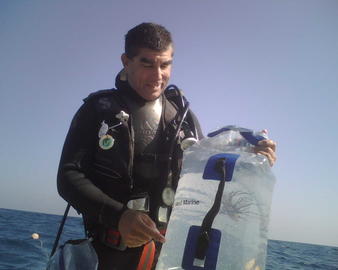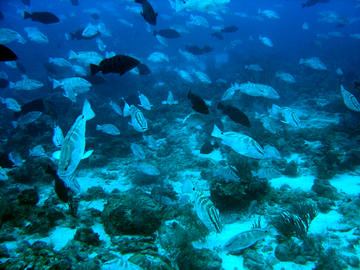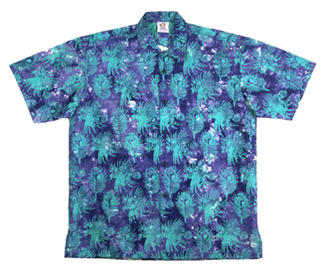Author: Lad Akins, REEF Director of Special Projects
While we all knew it was just a matter of time, the call still came with a bit of surprise and dread as the first confirmed lionfish sighting in the Florida Keys came in on January 6th, 2009. REEF member Becky Fowler, from Greenville, SC, was diving just offshore of the Benwood Wreck in Key Largo when she spotted the invasive lionfish near the base of a ledge at 66'. With all of the recent focus and outreach efforts that REEF has been forwarding to our members, she knew immediately that she needed to document the sighting and gather a detailed description of its location. Upon her return to shore, she called REEF HQ and delivered the report. This set into motion the Rapid Response plan
developed 7 months earlier in a REEF sponsored multi agency workshop (see REEFNotes article). Becky came by the REEF office, the images were verified, and her detailed site description was conveyed to Lad Akins, Director of Special Projects. The report was forwarded to the US Geological USGS alert system and Lad began response coordination with the Florida Keys National Marine Sanctuary (FKNMS) who has jurisdiction of resources at the sighting location.
The following morning, the response team made up of Lad Akins, Lisa Mitchell (REEF Exec. Dir.), John Halas (FKNMS), Frazier Nivens (Ocean Imaging) and Steve Campbell (Quiescence Diving Services) were assembled and on site at 10:30am. Following the excellent location description provided by Becky, the team was able to locate the fish, capture video footage, gather important data on site characteristics and the available nearby prey community, capture and bag the fish in under 14 minutes. The fish was captured live via hand nets, brought back to shore, euthanized and dissected. The 99mm immature male contained one 34mm prey fish in its stomach. Tissue samples, genetic material and other measurements were collected for further analysis by researchers at the NOAA Beaufort lab and Simon Fraser University. No other lionfish were found in the immediate vicinity.
While no one wanted to see lionfish show up in the Florida Keys, most knowledgeable sources believed it was inevitable and simply a matter of time. The one bright side of this story is that advanced planning and preparation initiated by REEF resulted in the awareness, accurate reporting, and successful rapid response effort that removed the fish less than 24 hours after its initial sighting. Hopes are that as lionfish show up in the Keys and other downstream areas, these rapid response efforts will help to control establishments and minimize impacts of this glutinous predator.
REEF continues to encourage divers to report their sightings of lionfish and other non-native fishes with as much detail as possible to www.reef.org/lionfish and to support lionfish research projects such as the January 17-24 project in the Turks and Caicos and the June 13-20 project in Belize. For more information, contact Lad Akins (Lad@REEF.org) (305) 852-0030.
Author: Christy Pattengill-Semmens, REEF Director of Science
REEF scientists, volunteers and collaborators will be in the Cayman Islands next month for the 8th year of the Grouper Moon Project. Thanks to a three-year grant awarded last year by the Lenfest Ocean Program of the Pew Charitable Trusts, REEF has greatly expanded the critical conservation research conducted as part of this study of Nassau grouper spawning aggregations. We will have teams on all three of the Cayman Islands conducting field research as part of the project, “The reproductive biology of remnant Nassau grouper stocks: implications for Cayman Islands Marine Protected Area (MPA) management”. The Little Cayman team will continue the long-term visual monitoring of the large aggregation located there. Work on Grand Cayman and Cayman Brac will focus on studying the remnant aggregations that remain on these islands after years of fishing. There is currently a harvest ban in effect for all aggregations in the islands. This ban is set to be lifted in 2011 unless the extension of the protections are warranted.
Despite logistical complications, weather anomalies and difficulties locating fish, the Grouper Moon Project had a successful year of field-work in 2008. The team conducted preliminary work on Cayman Brac and Grand Cayman, tagging Nassau grouper with pinger acoustic tags and then installing hydrophone arrays to track the movements of those tagged individuals. Studies were also conducted to better understand the patterns of recruitment by larval and juvenile Nassau grouper to the islands. In addition, members of our team attended major scientific conferences both nationally and internationally, and presented aspects of our research and findings to date.
In the Winter of 2002, REEF launched the Grouper Moon Project with a ground breaking expedition to observe the Nassau grouper spawning aggregation off the western tip of Little Cayman and to develop a protocol for monitoring their numbers and activity at the site. Since that first year, REEF has coordinated annual efforts to monitor and study the Little Cayman Nassau grouper aggregation. The project has grown in scope to include an ambitious acoustic tagging research project, juvenile habitat and genetics studies, and early results have been published in the scientific literature. This work is a collaboration with the Cayman Islands Department of the Environment and researchers from Oregon State University.
To find out more, visit the Grouper Moon Project webpage.
Author: Lisa Mitchell, REEF Executive Director
<<This article was originally published in January 2009. This promotion has ended. Please contact REEF HQ at trips@REEF.org to find out about current promotions with DiveAssure.>>
DiveAssure, a leader in the field of diving and dive-travel insurance, has committed to support REEF to advance our projects and activities that benefit marine environments. DiveAssure is offering REEF members a significant discount on two levels of coverage - 50% off the regular price for the Platinum program and 35% off the Diamond program. DiveAssure offers membership benefits including the best insurance programs that are tailored to meet the needs and demands of divers. Only DiveAssure offers primary coverage with the lowest deductibles and the highest limits. In addition, DiveAssure offers the only comprehensive dive and travel program available on the market. The Diamond program provides divers with multi-trip or single-trip annual coverage and is available in varying levels of trip cancellation/interruption limits, to ensure that your trip will always be covered, according to your needs.
DiveAssure cares about its members and the future of diving. That is why DiveAssure donates a percentage of its profits to the maintenance and improvement of local diving environments, dive medicine and dive research organizations as well as projects aimed at improving the safety and well-being of the diving environment.
To take advantage of the significant savings that DiveAssure is offering to REEF members, visit the DiveAssure webpage to determine which preferred level of coverage best suits your needs (discounts eligible on Platinum and Diamond programs only). Then contact DiveAssure toll free at 866-898-0921 Ext 1, 9 - 5 PM EST. Be sure to mention that you are a REEF member; you will be asked to provide your REEF member number for verification in order to receive the discounted pricing. If you can't remember your REEF member number, you can look it up here.
REEF greatly appreciates DiveAssure's support of our programs and their recognition of the importance of protecting our oceans!
Author: Lad Akins, REEF Director of Special Projects
The upcoming Peter Hughes Belize Lionfish awareness/outreach trip turns to lionfish research/removal after the first lionfish was discovered in Central American waters. Join REEF aboard the Sun Dancer II from June 13-20 for this exciting and fun diving adventures. Following eye opening presentations by REEF staff and partners at the recent DEMA dive show in October, long-time supporter Peter Hughes took on a new mission - to support REEF's efforts in addressing the lionfish invasion in the Caribbean. With his world-renowned fleet of liveaboard dive vessels and concern for the marine environment, Peter became an instant supporter after hearing details of the invasion. In stepping up to the plate, he offered his Belize-based liveaboard, Sun Dancer II, as a platform to raise funds and increase awareness of the issue during a June 13-20 expedition. Little did he know that within 2 short months, lionfish would actually show up in Belize in advance of our planned project.
Sun Dancer II instructors, leading a group of divers on Turneffe Reef, spotted a juvenile lionfish on December 11, 2008. Subsequent dives provided images verifying the sighting and Sun Dancer Captain Ryan Barnett, who had previously worked with REEF during Bahamas lionfish projects, put the early warning system into action through his report to REEF HQ. While the fish has yet to be recovered, Sun Dancer staff now have divers on the lookout and are stocking the vessel with collecting supplies.
While the fundraising efforts of the June project remain, the focus of the June project has now shifted to include more detailed data gathering and collection of any lionfish specimens found. Additional workshops are being organized with Belizean authorities to assist in development and implementation of their lionfish response plan. For those interested in joining the June 13-20 project aboard the Sun Dancer, please view the project webpage or contact Peter Hughes Diving directly at (800) 9-DANCER. For more information on the lionfish issue and to support REEF's efforts, go to www.reef.org/lionfish or contact Lad Akins (Lad@REEF.org) (305) 852-0030.
Author: REEF Staff
Batik Lionfish Shirts - Just added to the REEF Store. These stylish and comfortable shirts are a must for fish-lovers. These Rum Reggae shirts feature two pockets and are the fashion of choice for Paul Humann. Two design patterns available. $47 each. Visit the REEF Store to get yours today!
It's not too late to donate during our Winter Fundraising Campaign. The financial support of our members is critical to ensuring the long-term success of the marine conservation work that REEF accomplishes every day. All donations are tax-deductible and a gift of any size is greatly appreciated. For donations of $250 or more, you will be thanked with an exclusive signed Paul Humann print of a male jawfish guarding his eggs. There is a limited number of prints left so get yours today. Donate securely online or mail in a donation to REEF, PO Box 246, Key Largo, FL 33037.
National Geographic's Wild Chronicles will be using footage shot on REEF lionfish expeditions in an upcoming segment about invasive species in Florida. The theme for Episode Two (#402) of the new season is "What's the Culprit?". One of the segments in the episode investigates how non-native species including green iguanas, lionfish and hydrilla first arrived. The episode will begin airing on select PBS stations the week of January 12. Please check your local listings for exact air date and time.
REEF Field Survey trips and other special dive travel opportunities are filling up fast! Be sure to check out this year's schedule of learning expeditions and dive vacations on our REEF Trips Page.









